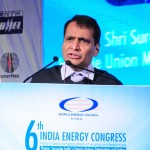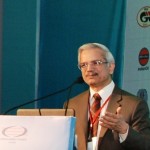This year’s Congress was particularly significant as it marked the beginning of the Congress being held as a joint event with Indian government ministries: the Ministries of Power, Coal, New & Renewable Energy, Petroleum & Natural Gas; External Affairs; and the Department of Atomic Energy. The event took shape under the leadership of the Steering Committee chaired by Mr R.N. Choubey, Special Secretary (Power) for India. Over 40 speakers led the discussions and more than 400 delegates attended.
In his keynote speech, Mr P.K. Sinha, Secretary for Power and Chair of WEC-India, said: “Energy is not only a vital input for development but also a vital factor for the political survival of any government.” Mr Sinha highlighted ongoing efforts made by the Indian government to improve energy availability and affordability, citing recent initiatives such as the current coal block auction process and potential plans to introduce competition in electricity retailing. The government, he added, will put extra efforts on scaling up renewables and energy efficiency measures.

Mr Dharmendra Pradhan, Minister of State Independent Charge for Petroleum and Natural Gas, stressed the need for a sustainable policy which is credible and offers continuity. He said the government is committed to provide reliable and affordable power for all by 2019 and LPG connections for 90% of the population. Mr Pradhan added that the availability of affordable energy is essential to drive government initiatives such as “Make in India”, a new national programme aimed to transform India into a global manufacturing hub.
Minister for Railways, Mr Suresh Prabhu, recognised the challenges posed by the current oil price volatility. “If the prices could go as high as they were and could go as low as of now, it is challenging time to devise policies,” he said, adding that it is therefore important for policies to be flexible and adapt to changing situations. India will need large amount of energy to power its manufacturing, services, transport, and urban development, and this, he said, heightens the need for integrated energy planning incorporating energy efficiency. In addition, he said that global partnerships are vital to helping India achieve its target of 100 GW of solar by 2022.
Dr Arup Roy Choudhury, Member Secretary for WEC-India and WEC Vice Chair for Asia Pacific & South Asia, reflected on the efforts made by WEC-India to be truly representative of the country’s energy sector. Dr Choudhury, who is also Chairman and Managing Director of NTPC, the national utility, mentioned how his company is putting efforts to meet India’s ambitious target for power from renewable by installing ‘mega’ solar power plants.
On oil and gas, Mr Saurabh Chandra, Secretary for the Ministry of Petroleum and Natural Gas, outlined measures taken to encourage exploration and production. Much of this is aimed to stimulate investment appetite. These include re-estimating the country’s hydrocarbon resources, facilitating the licensing and bidding process, and introducing a new domestic gas pricing formula which balances the expectations of the investor and consumer.

Discussions at the India Energy Congress also included regulatory aspects, end-use energy efficiency and energy finance. Deloitte, the consulting firm, once again produced a compendium of papers for the event. The proceedings of India Energy Congress 2015 will be available at the Congress website: www.indiaenergycongress.in/






_-80_result_688_387_s_c1_c_c.jpg)


